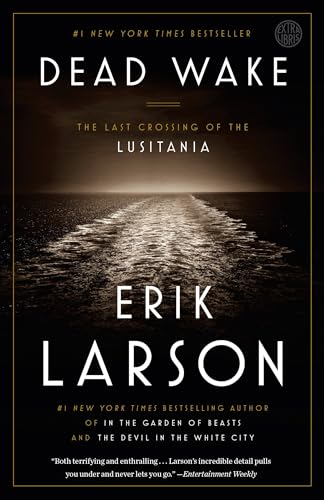Dead Wake
The Last Crossing of the Lusitania
Erik Larson
BOOK REVIEW

The tragedy of the RMS Lusitania is etched into the annals of maritime history-a swirling vortex of nationalism, greed, and tragic loss. In Erik Larson's gripping narrative, Dead Wake: The Last Crossing of the Lusitania, the reader is plunged into the depths of this calamity, experiencing the haunting echoes of its last voyage. This isn't just a recounting of an event; it's a pulse-pounding, deeply human saga that compels you to confront the very essence of fate and free will.
Larson, known for his ability to weave intricate historical tales, showcases his talent in this meticulously researched work that transcends mere documentation. He does not simply present facts; rather, he breathes life into the characters, pulling them from the shadows of history into vivid existence. Through the eyes of the ship's passengers, as well as the men behind the decisions that led to the Lusitania's fateful journey, Larson urges you to feel their hopes and fears, their moments of joy, and their inevitable despair.
Imagine being aboard a sleek ocean liner, a pearl of luxury gliding across the Atlantic, filled to the brim with the hopes and dreams of its passengers. Yet, lurking beneath the surface are the undercurrents of global tumult. The year is 1915, and World War I grips Europe in a veil of chaos. Here, Larson paints a backdrop teeming with political intrigue and the ever-present specter of danger. The Lusitania, a beacon of modernity, becomes an unwitting pawn in a deadly game of war-and as you dive deeper into the pages, that realization sends chills down your spine. ❄️
The luxury aboard the Lusitania starkly contrasts with the fateful reality awaiting it. Larson juxtaposes the opulence of its passengers against the grim political climate, crafting a narrative that is as beautiful as it is horrendous. You find yourself captivated by the stories of those on board-mothers clutching their children, lovers stealing glances across the ballroom, and the wealthy elite arranging deals that will ultimately lead to their demise. Each character dances through Larson's prose like a ghostly wraith, their stories fraying at the edges as the inevitability of their fate draws near.
As the pages turn, Larson skillfully intercuts the tragic journey with the machinations of British Intelligence and the strategies of the German U-boat captains. Here lies an important commentary on the blindness of ambition-the Lusitania is an object of both admiration and enmity. The tragic irony that seduced those aboard becomes painfully evident. The very things that made it grand-its speed, its luxury-render it a target in a world brimming with hostility. You can almost hear the echoes of warning that went unheeded, the death toll that could have been avoided had fate taken a different turn.
The climax is a visceral explosion of emotion, an undeniable pang of sorrow that rips through the reader as the ship meets its fate-sinking beneath the waves like a dark omen. In this moment, Larson's writing makes you feel the weight of history pressing down on your chest, a burden of loss that reverberates through time. It calls forth questions that haunt this country's past-a reminder of the high stakes that accompany global conflict. 🕊
Readers have had mixed reactions to Larson's work, with some praising his poetic prose and meticulous attention to detail, while others critique it as overly sentimental. However, herein lies the beauty of Dead Wake: it stirs debate, igniting conversations about the past that remain relevant in contemporary discourse. Larson doesn't just recount a historical moment; he transforms it into a meditation on human resilience and tragedy.
Ultimately, Dead Wake is not merely an exploration of a shipwreck; it is an urgent reminder of how history is woven from the stories of individuals caught in the tides of greater forces. Larson's narrative is a call to remember, a plea for recognition of the human experience amid chaos. A read that promises to twist your heart and awaken your mind, it challenges you not only to engage with the past but to reflect on how it echoes in our present reality.
As you set down this tome, you may find scars etched into your heart, remnants of a journey that was never meant to end. You are left to ponder: What lessons lie in the depths of history, and how do they resonate within us now? The wake of the Lusitania stretches far, and its lessons aren't merely historical footnotes-they serve as an urgent reminder to heed the warnings of the world around us. 🌊
📖 Dead Wake: The Last Crossing of the Lusitania
✍ by Erik Larson
🧾 480 pages
2016
#dead #wake #last #crossing #lusitania #erik #larson #ErikLarson